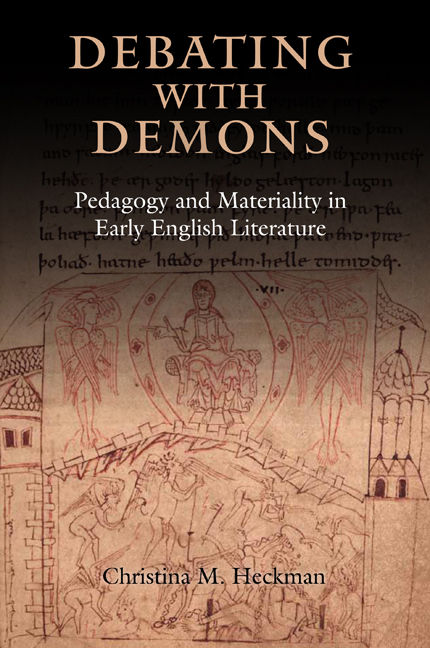Book contents
- Frotmatter
- Dedication
- Contents
- Introduction: The Devil’s Secret Chamber
- Part I Foundations
- 1 Spirituo-Materiality in the Early Middle Ages
- 2 The Artes Liberales in the Early Middle Ages
- 3 The Devil Within: Perils of Pedagogy in the Monastic School
- Part II The Demonic Magister in Early English Poetry
- 4 The Origin of the Teaching Demon: Lucifer as Magister
- 5 Demonic Teaching and the Fall in the Old English Genesis
- 6 Demonic Teaching and Saintly Discretio in Cynewulf’s Juliana
- 7 Inventing Materia: The True Cross and Saintly Disputation in Cynewulf’s Elene
- Conclusion: The Mysteries of Pedagogy
- Bibliography
- Index
- Acknowledgments
- Anglo-Saxon Studies
6 - Demonic Teaching and Saintly Discretio in Cynewulf’s Juliana
Published online by Cambridge University Press: 06 October 2020
- Frotmatter
- Dedication
- Contents
- Introduction: The Devil’s Secret Chamber
- Part I Foundations
- 1 Spirituo-Materiality in the Early Middle Ages
- 2 The Artes Liberales in the Early Middle Ages
- 3 The Devil Within: Perils of Pedagogy in the Monastic School
- Part II The Demonic Magister in Early English Poetry
- 4 The Origin of the Teaching Demon: Lucifer as Magister
- 5 Demonic Teaching and the Fall in the Old English Genesis
- 6 Demonic Teaching and Saintly Discretio in Cynewulf’s Juliana
- 7 Inventing Materia: The True Cross and Saintly Disputation in Cynewulf’s Elene
- Conclusion: The Mysteries of Pedagogy
- Bibliography
- Index
- Acknowledgments
- Anglo-Saxon Studies
Summary
In contrast to the Eve of the Junius 11 poems, female saints are ‘fortunate’ enough to be born into a fallen world, with the self-protective suspicions that come with discretio and the inclination to resist both questionable authority and deception. Although virgin martyr legends can seem formulaic, they nevertheless serve a crucial function as narratives in which women respond with unequivocal denial to an implicit but fundamental quaestio: ‘do earthly authorities have dominion over young women’s minds?’ In posing this quaestio at all, these hagiographical texts imply that the power of these earthly authorities, which can include families, kings, emperors, and even ecclesiastical leaders, is in doubt. Furthermore, in these stories, another quaestio emerges: ‘does dominion over the body also indicate control of the mind?’ The standard answer is again, of course, in the negative, fearlessly asserted by the martyrs in the midst of their suffering. In Cynewulf's Juliana, however, the saint reconfigures the quaestio itself, proposing instead a thorough integration of the body, mind, and soul that thwarts the premise of her tormentors’ arguments about their authority. Juliana's strength arises from this integration both before and after death, supported by Christianity's radical redefinition of the status of ‘the dead,’ their remains, and the places in which those remains dwelled as living relics.
Juliana's story also demonstrates the importance of the saint's participation in the informal logic of debate, particularly her ability to evaluate arguments, resist faulty premises, and narratively propose new implicit premises that transform the power structure of the world in which she and her followers dwell. In Cynewulf's poem, Juliana, a fourth-century saint from Nicomedia in present-day Turkey, defies the Roman governor Eleseus and rejects both his proposal of marriage and his devotion to the Empire's gods. The father of Juliana, Africanus, fails to persuade her into obedience and beats her, finally turning her over to Eleseus to be tortured. After repeatedly and publicly rejecting Eleseus, Juliana is thrown into prison, where a demon visits her, attempting to ‘teach’ her into yielding and worshipping Roman deities. Instructed by a voice from heaven, Juliana forces the demon to confess his pedagogical methods and his many crimes against God and his servants.
- Type
- Chapter
- Information
- Debating with DemonsPedagogy and Materiality in Early English Literature, pp. 152 - 177Publisher: Boydell & BrewerPrint publication year: 2020



